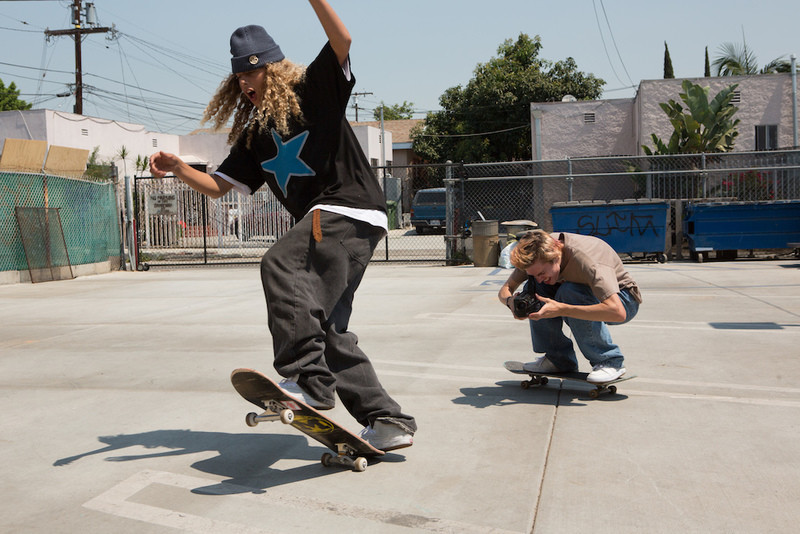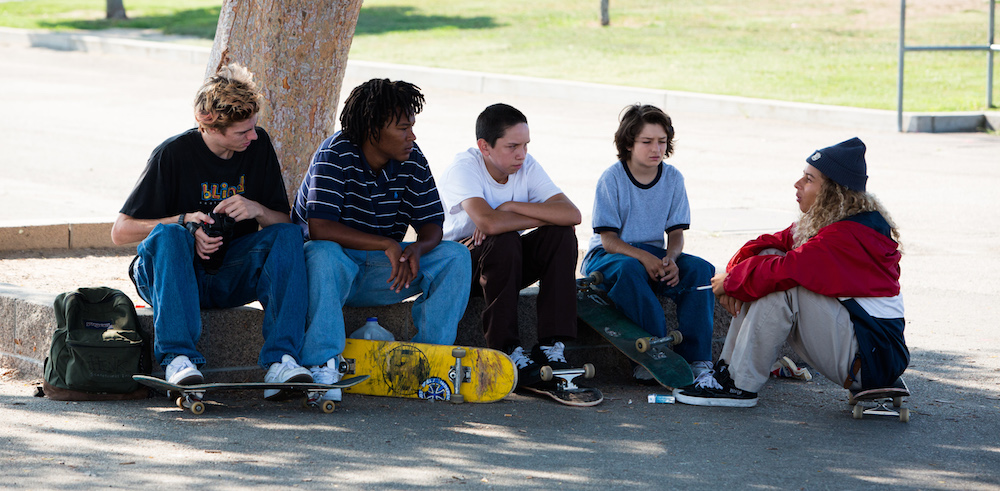“Mid90s” is a story that comes from a very personal, if not surprising part of writer/director Jonah Hill, who went from man-child comedy protege to two-time Oscar-nominee without playing characters who broadcasted his fandom for and deep knowledge of skateboarding culture. Using real-life skaters as his lead actors, and having an attention to period detail that explicitly eschews nostalgia porn, the movie nonetheless immerses us into the skater world, through the eyes of a young man (Sunny Suljic’s Stevie) trying to find an escape from his relationship with his violent older brother (Lucas Hedges) and his mother (Katherine Waterston). Stevie finds camaraderie, and a wealth of life lessons, during his time skating and chilling with the likes of Fuckshit (Olan Prenatt), Fourth Grade (Ryder McLaughlin) and Ruben (Gio Galicia), and the wise, older Ray (Na-Kel Smith).
RogerEbert.com spoke these young actors about making the film, the music that Hill turned them onto, the different details that keep the story genuine to the ‘90s and more.
When you guys were all on set, what was a day of shooting like?
SUNNY SULJIC: Every single day it was always something new. It was always like a different scene and it was just like, every single day each emotion was like different for me, at least. It was insane, we’d all see each other and get happy. It was one of the best experiences, I loved it and want to do it again.
You should pressure Jonah for a sequel.
SS: You can’t do a sequel with these types of films, it will be a classic and it’s already said its thing, and then sequels are like … I don’t know, it’s like saying a sequel for “The Grand Budapest Hotel.”
What about for you guys?
RYDER MCLAUGHLIN: It felt like I was going to school. You get to school and it’d be like, you’re getting your make-up done and you’re seeing your friends in homeroom … messing around and then you go to work and do stuff.
GIO GALICIA: That’s such a good way to put it. I never thought of it like that.
SS: That was alright.
GG: Nah, that was on fire.
RM: Yeah, don’t steal that from me.

Did it feel like the ‘90s when you were on set? Did Jonah do anything in particular to give you the feel of the period?
SS: Oh yeah, like, a lot of the scenes that didn’t really make it into the movie, it felt like the time period definitely. There was a Fatburger scene, and the Fatburger looked like it was exactly in the ‘90s. We just walked in and I came out of the van and I just saw “Fatburger.” And I’ve seen photos of the Fatburgers from the ‘90s, and it was the exact same. It helped me out so much, I was like damn I’m really in the ‘90s and in the character. I invested so much of my time. And all the food, the works, everything.
OLAN PRENATT: And the pictures on the wall, I remember hearing Jonah talk to the set decorator, and he said, “Are you sure that this is an archive?” Everything was verbatim from the ‘90s.
Was it weird to play a character in the ‘90s?
SS: It was probably the best strange that it could be. It was a lot of craziness, but I loved it so much. I’m just smiling thinking about it.
OP: We watched films, listened to iPods that he gave us that the specific characters would listen to. Because you can understand a lot from somebody’s music selection. And that was pretty much a part of the character adjusting.
He gave you actual iPods?
OP: Literal iPod. It says like, “Mid90s” on the back of it. It’s so cool.
Don’t lose it! Or sell it and make a lot of money.
SS: I’m not selling mine!
OP: Yeah, I prefer listening to that iPod then going on YouTube. It’s awesome.
What was the moment that you guys knew that Jonah knew what he was doing?
SS: The first minute I met him. I read the script, I mean, the first audition, it had so much meaning into it.
What was your first audition?
SS: The first audition was the skate shop scene, and a scene actually with my mom, the Benihana scene. I already felt it, and we did a chemistry test where we were all there together, and it just felt right. The script, I mean Jonah put so much time, work and effort, it just turned out so great, and I loved it.
OP: One time that I felt like that was when we all went into the skate shop, and I seen all of the ads that were posted on the wall, the boards that were posted on the wall. Every board was actual graphics from that era, the wheels. Everything in the skate shop, and I realized that, wow, Jonah, I skated when I was younger and you were really a part of that culture, to the T.

Does he skate now?
OP: He did a kickflip on set.
RM: I think he hurt his knee. Not on set, but before.
SS: He was already hurt, and then he did a kickflip. It wasn’t like he hurt himself on a kick flip.
He’s not a skateboarder but he knows the culture.
OP: He’s a part of that culture. He’s not just a fan of that culture and knows it, he’s a part of the skateboarding culture.
RM: But also, tasteful. He’s super into a lot of things that … I remember a long time ago there’s a company called Crailtap, and they have like a mini top five, and Spike Jonze is a part of that company. And it was Jonah Hill outside of a skate shop in New York talking about his top five favorite skate videos, and it’s videos I’ve never heard of. A lot of them were from the ‘90s, and they were stuff you probably watched growing up, and it was like, I don’t even know this stuff.
SS: Yeah, definitely. If Jonah did not skate, it would not be how it is. The skate shops … that is such an accurate representation of how the ‘90s looked, how everybody’s just hanging out, and how genuine it is.
OP: Super respectful to the skateboarding culture.
The language in the movie is very ‘90s, but crude with casual usage of words like “fag,” “retard,” “gay,” etc. Did you guys talk with Jonah much about that?
SS: It just sparked—I have an insane note on that. Jonah was saying that if there was not any of that, it would be fake. Completely fake. So I think it was smart for putting that in because if he would just fake that, it was really real, and that little … it wasn’t too subtle, it was pretty out there, but that was one of the main things in the ‘90s.
It feels like people were a little more casual with those words back then.
SS: Yeah, people were more casual. Those little slurs. But we all definitely talked about that.
OP: But also during one of the Q&As in the beginning of the press tour, he said that the best feedback that he got was, “Oh, so you guys are gonna release a movie from the ‘90s.” So all of that was a part of being genuine to the ‘90s.

Did you guys pick up any new music or new interests while working on this movie?
OP: Cypress Hill, I wasn’t really open to that style. [laughs]
SS: I love the … OK, so as we got the iPod, a lot of those songs were on the soundtrack. And I loved all those songs on the soundtrack, especially when I go in my brother’s room and the first song that plays, that was one of my favorite songs.
OP: Oh, one thing—one of my favorite songs is the song that I went into the party and came out with a bunch of 40s. That song is crazy. The first time I heard it, he played the scene back right after we filmed it and then added the music to it. And then play music on his phone, and I thought he was just seeing how it would go. But that was the song, and I was like, “Whoa, this is insane.”
RM: I had to look that song up after. There’s like a Wu-Tang song that they sampled …
There’s a GZA song in there.
OP: Yeah, yeah. I originally heard the Pharrell version! And I was like, “Whoa.”
GG: I feel like after we got the iPods, I listened to all the music, and it just opened a new genre of music. And more ‘90s music, it was so sick. I tried to look up most of the music.
SS: There was a lot of Wu-Tang songs on there. They were super sick.
GG: Huh?
SS: The Wu-Tang songs?
GG: Oh yeah, those were sick.

This movie’s about people being shaped by who they know, and what they do. Who is someone that was a big influence on you?
SS: That’s probably exactly what I would say, but also Jonah. I mean, skateboarding definitely made me realize at like a younger age, I just saw the world at a younger age so i’m more open minded. Jonah, I mean, taught me a lot of things, acting as well, but just also personal things to know, because he’s been in the acting industry for such a long time. There are definitely things that he’s taught me.
What has Jonah told you as someone who was once also a young actor in the industry?
SS: Just influencing me, because he was growing up in the ‘90s, it was a lot of negativity with speech, you know? And just be aware of what you’re saying, and who you’re talking to. I would get into detail, but they are Jonah’s secrets and personal information. [laughs]
What about you guys? Who had a big influence on you?
RM: As a person? My mom and my dad.
GG: Before I started skating, I was always just inside my house. I wasn’t really going out, trying to explore. And that’s when I found skating. It opened me up to a ton of different types of people. I feel like I connected with older people, so I would always hang with older people and see how they reacted to everything else, and it was so much different than how I would react to stuff. I feel like it matured me, in the better way.
OP: I would agree with Gio, I think with skateboarding, you can experience … all the things we go through and see and are exposed to through skateboarding really shape who I am. So if skateboarding was a person, skateboarding. [laughs]












